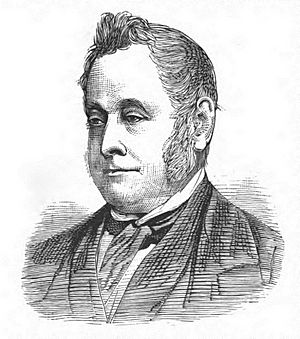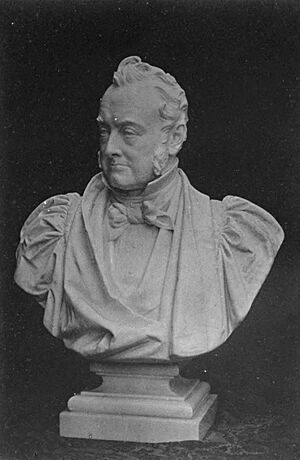William George Ward facts for kids
Quick facts for kids
William George Ward
|
|
|---|---|

Engraving of William George Ward (1883)
|
|
| Born | 21 March 1812 London
|
| Died | 6 July 1882 (aged 70) Hampstead, London
|
| Alma mater | Balliol College, Oxford |
| Scientific career | |
| Fields | Mathematics and Theology |
| Institutions | St. Edmund's College |
William George Ward (born March 21, 1812 – died July 6, 1882) was an English thinker who studied both religion and mathematics. He became a Roman Catholic later in his life. His journey shows how religious ideas changed during an important time in English history.
Contents
William Ward's Early Life and Education
William Ward was the son of William Ward and Emily Combe. He went to Winchester College for his early education. In 1830, he started studying at Christ Church, Oxford. However, his father faced money problems. This meant William had to try for a scholarship at Lincoln College in 1833, which he successfully earned.
Ward was very good at pure mathematics. But he didn't like subjects like history or applied mathematics very much. He had a strong sense of humor and enjoyed being a bit unusual in his ideas. During his math exams, he left four out of five papers on applied mathematics completely blank! Even so, he still earned honors. In 1834, he won a scholarship to Balliol.
Joining the Tractarian Movement
In 1833, a religious movement called Tractarianism began. Ward was drawn to it because he disliked being too moderate or "respectable." At first, he didn't think much of John Henry Newman, a key leader of the movement. Ward saw Newman as just someone interested in old things.
However, a friend convinced Ward to listen to Newman preach. After that, Ward quickly became a follower. Newman later said that Ward "struck into the movement at an angle." This meant Ward approached it differently. He wasn't interested in historical research. Instead, he saw the religious questions as matters of logic.
Ward disliked the Protestant Reformers and their idea of private judgment in religion. He also found the English Church a bit plain. So, he strongly argued against Protestantism in general and the Anglican Church in particular. Despite his strong views, he became a deacon in 1838 and a priest in 1840.
Controversy and Conversion to Catholicism
In 1839, Ward started writing for the British Critic. This was a magazine for the Tractarian group. He caused concern among his own group because he strongly criticized the Anglican Church, even though he was still a part of it. In 1841, he pushed for the famous Tract 90 to be published and defended it.
From that time on, Ward and his friends openly worked towards joining the Roman Catholic Church. In 1844, he published his book Ideal of a Christian Church. In this book, he clearly argued that the only way for the Church of England to improve was to submit to the Church of Rome.
This book caused a huge stir. On February 13, 1845, the University of Oxford was asked to condemn Tract 90, criticize Ward's Ideal, and take away his university degrees. The proposals to criticize his book and remove his degrees passed. Ward lost his teaching position. Tract 90 was only saved from being condemned because two officials, Guillemard and Church, voted against it.
In September 1845, Ward left the Church of England. Many others followed him, including Newman himself. After becoming a Catholic, Ward focused on studying ethics (moral principles), metaphysics (the nature of reality), and moral philosophy. He got married after his conversion and faced some financial struggles at first. But his situation slowly got better. In 1851, he became a professor of moral philosophy at St Edmund's College in Ware. The next year, he was given the job of teaching dogmatic theology, which is about the official beliefs of the Church.
Editing the Dublin Review
Ward wrote many articles for the Dublin Review magazine. These articles covered topics like free will, the philosophy of theism (belief in God), science, prayer, and miracles. In 1863, he became the editor of the Dublin Review and held this role until 1878.
When he took over as editor in July 1863, he let other sub-editors make decisions about politics, history, or literature. Ward was against "Liberal Catholicism," which was a more open-minded approach to Catholic teachings. He strongly defended the Pope's authority. He criticized the ideas of people like Charles Forbes René de Montalembert and Ignaz von Döllinger. He also supported the official declaration of the dogma of Papal Infallibility in 1870. This belief states that the Pope cannot make mistakes when speaking officially on matters of faith and morals.
Ward also wrote about the condemnation of Pope Honorius I. He had a public debate through letters with John Stuart Mill, a famous philosopher. He also played a big part in discussions held by the Metaphysical Society.
William Ward's Family Life
William George Ward was part of a notable family. He was the grandnephew of Robert Plumer Ward. He was also the nephew of Sir Henry George Ward, and the son of William Ward.
His son, Wilfrid Philip Ward, later wrote a biography about John Henry Newman. William George Ward was also the grandfather of Father Leo Ward, who was a missionary in Japan and helped start the publishing company Sheed & Ward. Leo's sister, Maisie Ward, was also a writer and publisher. William George Ward's great-grandchildren include the translator Rosemary Sheed and the novelist Wilfrid Sheed. One of his daughters became a Benedictine nun and was known as Lady Abbess of Oulton Abbey in Staffordshire.
William Ward's Published Works
- The Ideal of a Christian Church (1844)
- The Anglican Establishment Contrasted (1850)
- Heresy and Immortality (1851)
- On Nature and Grace: A Theological Treatise (1860)
- The Relation of Intellectual Power to Man's True Perfection (1862)
- The Authority of Doctrinal Decisions Which are not Definitions of Faith, Considered in a Short Series of Essays Reprinted from "The Dublin Review" (1866)
- De Infallibilitatis Extensione (1869)
- Essays on Devotional and Scriptural Subjects (1879)
- The Condemnation of Pope Honorius (1879)
- Essays on the Church's Doctrinal Authority (1880)
- Essays on the Philosophy of Theism Vol. 1 Vol. 2 (1884)
Selected articles
- "Intrinsic End of Civil Government," The Dublin Review, Vol. LIII (1863).
- "The Dogmatic Principle," The Dublin Review, Vol. LIII (1863).
- "The 'Union' Movement," The Dublin Review, Vol. LIV (1864).
- "Rome and the Munich Congress," The Dublin Review, Vol. LV (1864).
- "The University Question," The Dublin Review, Vol. LVI (1865).
- "The Encyclical and Syllabus," The Dublin Review, Vol. LVI (1865).
- "Public School Education," The Dublin Review, Vol. LVII (1865).
- "Rome, Unionism, and Indifferentism," The Dublin Review, Vol. LVII (1865).
- "Mr. Oxenham and the 'Dublin Review'," The Dublin Review, Vol. LVII (1865).
- "Doctrinal Decrees of a Pontifical Congregation: The Case of Galileo," The Dublin Review, Vol. LVII (1865).
- "Dr. Pusey's Apology for Anglicanism," The Dublin Review, Vol. LVIII (1866).
- "Dr. Pusey's Project of Union," The Dublin Review, Vol. LVIII (1866).
- "The Council of Florence," The Dublin Review, Vol. LVIII (1866).
- "Irish Writers on University Education," The Dublin Review, Vol. LIX (1866).
- "Dr. Pusey on Marian Devotion," The Dublin Review, Vol. LIX (1866).
- "Pius IX. and the 'Civiltà Cattolica'," The Dublin Review, Vol. LIX (1866).
- "Two Criticisms on the Dublin Review," The Dublin Review, Vol. LX (1867).
- "Science, Prayer, Free Will and Miracles," The Dublin Review, Vol. LX (1867).
- "Doctrinal Apostolic Letters," The Dublin Review, Vol. LXII (1868).
- "The Witness of Heretical Bodies to Mariology," The Dublin Review, Vol. LXII (1868).
- "The Irish Disestablishment," The Dublin Review, Vol. LXIII (1868).
- "Principles of Catholic Higher Education," The Dublin Review, Vol. LXIV (1869).
- "Catholic Controversy," The Dublin Review, Vol. LXV (1869).
- "Grignon de Monfort and his Devotion," The Dublin Review, Vol. LXVIII (1871).
- "The Definition of Papal Infallibility," The Dublin Review, Vol. LXVIII (1871).
- "Certitude in Religious Assent," The Dublin Review, Vol. LXVIII (1871).
- "Copernicanism and Pope Paul V," The Dublin Review, Vol. LXVIII (1871).
- "The Rule and Motive of Certitude," The Dublin Review, Vol. LXIX (1871).
- "Galileo and the Pontifical Congregations," The Dublin Review, Vol. LXIX (1871).
- "Mr. Mill's Denial of Necessary Truth," The Dublin Review, Vol. LXIX (1871).
- "Liberalism Religious and Ecclesiastical," The Dublin Review, Vol. LXX (1872).
- "Mr. Mill on the Foundation of Morality," The Dublin Review, Vol. LXX (1872).
- "Father Liberatore, Father Harper, and Lord Robert Montagu," The Dublin Review, Vol. LXX (1872).
- "Parliament and Catholic Education," The Dublin Review, Vol. LXX (1872).
- "The Priesthood in Irish Politics," The Dublin Review, Vol. LXXI (1872).
- "A Word on Classical Studies," The Dublin Review, Vol. LXXI (1872).
- "The Present Anglican Position," The Dublin Review, Vol. LXXI (1872).
- "The Labourers and Political Economy," The Dublin Review, Vol. LXXII (1873).
- "Irish Priests and Landlords," The Dublin Review, Vol. LXXII (1873).
- "A Few Words on Dr. Brownson's Philosophy," The Dublin Review, Vol. LXXVIII (1876).
- "Father O'Reilly on Society and the Church," The Dublin Review, Vol. LXXVIII (1876).
- "Tradition and Papal Infallibility," The Dublin Review, Vol. LXXVIII (1876).
- "Church and State," The Dublin Review, Vol. LXXVIII (1876).
- "Professor Mivart on the Rights of Conscience," The Dublin Review, Vol. LXXIX (1876).
- "Cremation," The Dublin Review, Vol. LXXIX (1876).
- "Mr. Mill on Causation," The Dublin Review, Vol. LXXIX (1876).
- "Civil Intolerance of Religious Error: Professor Mivart on Liberty of Conscience," The Dublin Review, Vol. LXXX (1877).
- "Hergenröther on Church and State," The Dublin Review, Vol. LXXXI (1877).
- "Mr. Shadworth Hodgson on Free Will," The Dublin Review, Vol. LXXXVII (1880).
- "Philosophy of the Theistic Controversy," The Dublin Review, Vol. LXXXIX (1882).
See also
 In Spanish: William George Ward para niños
In Spanish: William George Ward para niños
 | Bayard Rustin |
 | Jeannette Carter |
 | Jeremiah A. Brown |


